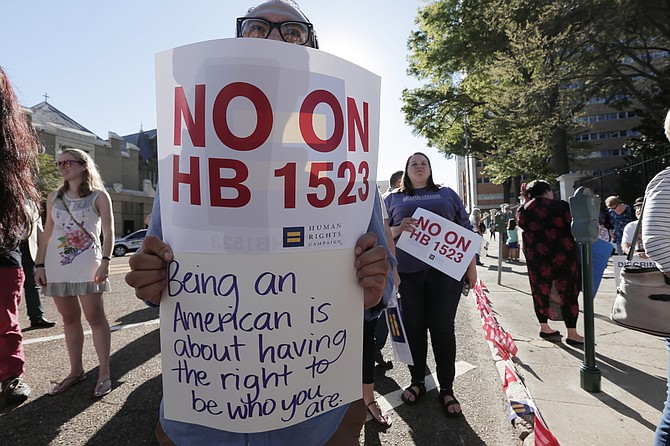Several protests broke out after the Mississippi Legislature passed and the governor signed House Bill 1523, allowing discrimination of LGBT citizens, in 2016. The 5th U.S. Circuit Court of Appeals heard arguments in the governor's appeal of the overturned law on Monday. Photo by Imani Khayyam.
JACKSON — The rights of LGBT Mississippians were in the balance Monday as attorneys from Mississippi and beyond faced off in Texas over whether House Bill 1523, the "Protecting Freedom of Conscience from Government Discrimination Act," should become law in the state or if it is what one judge referred to as "state-sponsored discrimination."
U.S. District Judge Carlton Reeves struck down the law, signed by Gov. Phil Bryant, last year right before the measure was set to go into law. Attorneys Rob McDuff with the Mississippi Center for Justice and Roberta Kaplan represented plaintiffs from the Campaign for Southern Equality, and defended Reeves' decision that HB 1523 violates the U.S. Constitution.
Jonathan Mitchell, a Missouri attorney representing the governor and John Davis, the executive director of the Mississippi Department of Human Services, argued that Reeves should not have blocked the bill from becoming law. Mitchell said that McDuff and Kaplan's clients failed to prove standing in the case. He asked the judges to vacate the preliminary injunction, saying Mississippians represented by the plaintiffs have not proven any actual injury due to the law's impending enactment.
The appeals judges asked what "concrete and particularized" injury the plaintiffs would need to show, pointing to one plaintiff, Renick Taylor, who plans to get married.
"They would have to show they are about to get married," Mitchell said. "Then they would have to show that they're going to get married in Mississippi."
U.S. Court of Appeals Judge Catharina Haynes asked Mitchell several questions about the statute's constitutionality.
"If you have somebody who goes to get a marriage license, and they walk up to the counter and say, 'Oh, I'm marrying Jane, and so we would like our license,' and the clerk goes, 'Oh, uh, ehhhh, I'm recused,' and goes running down the hall and has to say, 'Let me go see if there's anyone who will give you a license," to me I'm not sure that isn't state-sponsored discrimination," Haynes told Mitchell.
"That's not permitted under the statute," he said.
"Why isn't that permitted? ... There's nothing that prevents that (from happening)," Haynes said.
Mitchell pushed back. "If a clerk or state employee is recused, the issuance of a license cannot be delayed in any matter, even in your Honor's hypothetical ... steps must be taken under the statute to prevent that from happening," Mitchell said.
Kaplan later pointed out that the bill does not detail any of those steps that must happen to prevent discrimination.
Judge Haynes later asked Mitchell whether passing HB 1523 constituted state inaction on recognizing same-sex marriage ordered by the U.S. Supreme Court.
"... You've passed a statute that expressly allows the state to bless that non-recognition (of same-sex marriage)," she said.
"'Bless' is an overstatement Judge Haynes. The state is allowing it to occur without penalty or reprisal from the state. It's not a blessing; it's just the state failing to punish or discriminate or take adverse action against those people who act in a manner in accordance with their conscience," Mitchell said.
Kaplan argued that HB 1523 violates the Establishment Clause of the First Amendment. While her clients believe, she said, that differing religious beliefs about marriage exist, officials must enact religious accommodations laws in neutral ways.
"Unlike any other religious accommodations statute of which we are aware, HB 1523 begins with the endorsement of three specific religious beliefs, and then based upon those beliefs permits what I call the 'kitchen sink approach'—an extremely broad and open-ended range of exemptions and conduct," Kaplan told the three-judge panel.
Kaplan argued that the stigma for her clients alone was enough to block the statute from becoming state law, but also noted several specific examples of LGBT Mississippians experiencing discrimination since Gov. Bryant signed the bill. She said she would add new parties to the case if it was sent back for more discovery.
McDuff also argued that HB 1523 violates his clients' equal protection rights, saying that the unequal treatment they have experienced comes from the potential unequal protection built into the law.
Note: State reporter Arielle Dreher used oral argument recordings to write this story; she was not in Texas for the hearings. Email her at [email protected].



